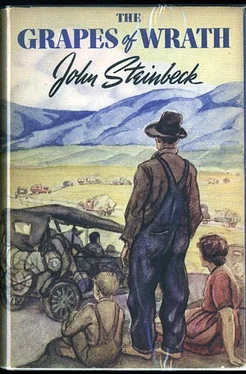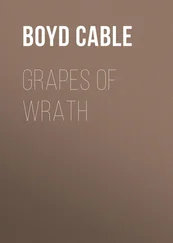John Steinbeck - The Grapes of Wrath
Здесь есть возможность читать онлайн «John Steinbeck - The Grapes of Wrath» весь текст электронной книги совершенно бесплатно (целиком полную версию без сокращений). В некоторых случаях можно слушать аудио, скачать через торрент в формате fb2 и присутствует краткое содержание. Город: New York, Год выпуска: 1939, Издательство: The Viking Press-James Lloyd, Жанр: Классическая проза, на английском языке. Описание произведения, (предисловие) а так же отзывы посетителей доступны на портале библиотеки ЛибКат.
- Название:The Grapes of Wrath
- Автор:
- Издательство:The Viking Press-James Lloyd
- Жанр:
- Год:1939
- Город:New York
- ISBN:нет данных
- Рейтинг книги:5 / 5. Голосов: 1
-
Избранное:Добавить в избранное
- Отзывы:
-
Ваша оценка:
- 100
- 1
- 2
- 3
- 4
- 5
The Grapes of Wrath: краткое содержание, описание и аннотация
Предлагаем к чтению аннотацию, описание, краткое содержание или предисловие (зависит от того, что написал сам автор книги «The Grapes of Wrath»). Если вы не нашли необходимую информацию о книге — напишите в комментариях, мы постараемся отыскать её.
The Grapes of Wrath — читать онлайн бесплатно полную книгу (весь текст) целиком
Ниже представлен текст книги, разбитый по страницам. Система сохранения места последней прочитанной страницы, позволяет с удобством читать онлайн бесплатно книгу «The Grapes of Wrath», без необходимости каждый раз заново искать на чём Вы остановились. Поставьте закладку, и сможете в любой момент перейти на страницу, на которой закончили чтение.
Интервал:
Закладка:
Noah said slowly, “Maybe if you got them side-boards all true on, we could load up this stuff. Load her up so maybe if Al comes in—”
“I can drive her, if that’s what you want,” Tom said. “I drove truck at McAlester.”
“Good,” said Pa, and then his eyes stared down the road. “If I ain’t mistaken, there’s a young smart aleck draggin’ his tail home right now,” he said. “Looks purty wore out, too.”
Tom and the preacher looked up the road. And randy Al, seeing he was being noticed, threw back his shoulders, and he came into the yard with a swaying strut like that of a rooster about to crow. Cockily, he walked close before he recognized Tom; and when he did, his boasting face changed, and admiration and veneration shone in his eyes, and his swagger fell away. His stiff jeans, with the bottoms turned up eight inches to show his heeled boots, his three-inch belt with copper figures on it, even the red arm bands on his blue shirt and the rakish angle of his Stetson hat could not build him up to his brother’s stature; for his brother had killed a man, and no one would ever forget it. Al knew that even he had inspired some admiration among boys of his own age because his brother had killed a man. He had heard in Sallisaw how he was pointed out: “That’s Al Joad. His brother killed a fella with a shovel.”
And now Al, moving humbly near, saw that his brother was not a swaggerer as he had supposed. Al saw the dark brooding eyes of his brother, and the prison calm, the smooth hard face trained to indicate nothing to a prison guard, neither resistance nor slavishness. And instantly Al changed. Unconsciously he became like his brother, and his handsome face brooded, and his shoulders relaxed. He hadn’t remembered how Tom was.
Tom said, “Hello. Jesus, you’re growin’ like a bean! I wouldn’t of knowed you.”
Al, his hand ready if Tom should want to shake it, grinned self-consciously. Tom stuck out his hand and Al’s hand jerked out to meet it. And there was liking between these two. “They tell me you’re a good hand with a truck,” said Tom.
And Al, sensing that his brother would not like a boaster, said, “I don’t know nothin’ much about it.” Pa said, “Been smart-alecking aroun’ the country. You look wore out. Well, you got to take a load of stuff into Sallisaw to sell.” Al looked at his brother Tom. “Care to ride in?” he said as casually as he could.
“No, I can’t,” said Tom. “I’ll help aroun’ here. We’ll betogether on the road.”
Al tried to control his question. “Did—did you bust out? Of jail?”
“No,” said Tom. “I got paroled.”
“Oh.” And Al was a little disappointed.
CHAPTER 9
IN THE LITTLE HOUSES the tenant people sifted their belongings and the belongings of their fathers and of their grandfathers. Picked over their possessions for the journey to the west. The men were ruthless because the past had been spoiled, but the women knew how the past would cry to them in the coming days. The men went into the barns and the sheds.
That plow, that harrow, remember in the war we planted mustard? Remember a fella wanted us to put in that rubber bush they call guayule? Get rich, he said. Bring out those tools—get a few dollars for them. Eighteen dollars for that plow, plus freight—Sears Roebuck.
Harness, carts, seeders, little bundles of hoes. Bring em out. Pile ’em up. Load ’em in the wagon. Take ’em to town. Sell ’em for what you can get. Sell the team and the wagon, too. No more use for anything.
Fifty cents isn’t enough to get for a good plow. That seeder cost thirty-eight dollars. Two dollars isn’t enough. Can’t haul it all back—Well, take it, and a bitterness with it. Take the well pump and the harness. Take halters, collars, hames, and tugs. Take the little glass brow-band jewels, roses red under glass. Got those for the bay gelding. ’Member how he lifted his feet when he trotted?
Junk piled up in a yard. Can’t sell a hand plow any more. Fifty cents for the weight of the metal. Disks and tractors, that’s the stuff now.
Well, take it—all junk—and give me five dollars. You’re not buying only junk, you’re buying junked lives. And more—you’ll see—you’re buying bitterness. Buying a plow to plow your own children under, buying the arms and spirits that might have saved you. Five dollars, not four. I can’t haul ’em back—Well, take ’em for four. But I warn you, you’re buying what will plow your own children under. And you won’t see. You can’t see. Take ’em for four. Now, what’ll you give for the team and wagon? Those fine bays, matched they are, matched in color, matched the way they walk, stride to stride. In the stiff pullstraining hams and buttocks, split-second timed together. And in the morning, the light on them, bay light. They look over the fence sniffing for us, and the stiff ears swivel to hear us, and the black forelocks! I’ve got a girl. She likes to braid the manes and forelocks, puts little red bows on them. Likes to do it. Not any more. I could tell you a funny story about that girl and that off bay. Would make you laugh. Off horse is eight, near is ten, but might of been twin colts the way they work together. See? The teeth. Sound all over. Deep lungs. Feet fair and clean. How much? Ten dollars? For both? And the wagon—Oh, Jesus Christ! I’d shoot ’em for dog feed first. Oh, take ’em! Take ’em quick, mister. You’re buying a little girl plaiting the forelocks, taking off her hair ribbon to make bows, standing back, head cocked, rubbing the soft noses with her cheek. You’re buying years of work, toil in the sun; you’re buying a sorrow that can’t talk. But watch it, mister. There’s a premium goes with this pile of junk and the bay horses—so beautiful—a packet of bitterness to grow in your house and to flower, some day. We could have saved you, but you cut us down, and soon you will be cut down and there’ll be none of us to save you.
And the tenant men came walking back, hands in their pockets, hats pulled down. Some bought a pint and drank it fast to make the impact hard and stunning. But they didn’t laugh and they didn’t dance. They didn’t sing or pick the guitars. They walked back to the farms, hands in pockets and heads down, shoes kicking the red dust up.
Maybe we can start again, in the new rich land—in California, where the fruit grows. We’ll start over.
But you can’t start. Only a baby can start. You and me—why, we’re all that’s been. The anger of a moment, the thousand pictures, that’s us. This land, this red land, is us; and the flood years and the dust years and the drought years are us. We can’t start again. The bitterness we sold to the junk man—he got it all right, but we have it still. And when the owner men told us to go, that’s us; and when the tractor hit the house, that’s us until we’re dead. To California or any place—every one a drum major leading a parade of hurts, marching with our bitterness. And some day—the armies of bitterness will all be going the same way. And they’ll all walk together, and there’ll be a dead terror from it.
The tenant men scuffed home to the farms through the red dust.
When everything that could be sold was sold, stoves and bedsteads, chairs and tables, little corner cupboards, tubs and tanks, still there were piles of possessions; and the women sat among them, turning them over and looking off beyond and back, pictures, square glasses, and here’s a vase.
Now you know well what we can take and what we can’t take. We’ll be camping out—a few pots to cook and wash in, and mattresses and comforts, lantern and buckets, and a piece of canvas. Use that for a tent. This kerosene can. Know what that is? That’s the stove. And clothes—take all the clothes. And—the rifle? Wouldn’t go out naked of a rifle. When shoes and clothes and food, when even hope is gone, we’ll have the rifle. When grampa came—did I tell you?—he had pepper and salt and a rifle. Nothing else. That goes. And a bottle for water. That just about fills us. Right up the sides of the trailer, and the kids can set in the trailer, and granma on a mattress. Tools, a shovel and saw and wrench and pliers. An ax, too. We had that ax forty years. Look how she’s wore down. And ropes, of course. The rest? Leave it-or burn it up.
Читать дальшеИнтервал:
Закладка:
Похожие книги на «The Grapes of Wrath»
Представляем Вашему вниманию похожие книги на «The Grapes of Wrath» списком для выбора. Мы отобрали схожую по названию и смыслу литературу в надежде предоставить читателям больше вариантов отыскать новые, интересные, ещё непрочитанные произведения.
Обсуждение, отзывы о книге «The Grapes of Wrath» и просто собственные мнения читателей. Оставьте ваши комментарии, напишите, что Вы думаете о произведении, его смысле или главных героях. Укажите что конкретно понравилось, а что нет, и почему Вы так считаете.











